A disobedient child is forgiven after being contrite for playing in the mud after being ordered by his parents not to do so. Although he’s been forgiven, he’s still not allowed to enter into the pristine atmosphere of the family dining room – until he serves a small punishment, takes a bath, and changes his filthy clothes.
This simple principle and double-distinction may be applied to the doctrine of Purgatory.
Souls in Purgatory have had their sins forgiven and know their eternal destiny is Heaven. But nothing impure can enter the glorious gates of Heaven and remain in the fullness of the presence of God. People must do penance for their transgressions, and by the fire of God’s love be purged of their impurity and lingering attachment to sin.
So, as the forgiven child could not enter the banquet room until he atoned for his act and is completely cleansed of the effects, so too the forgiven soul cannot enter the heavenly banquet until he has “paid the last penny” (Mt 5:26) of sacrifice and penance and is purged of the effects of his sins. Only then, when the soul is made perfect (Mt 5:48), is it able to experience the beatific vision and rise with its glorified body on the last day. Only then may he enjoy the bliss of the everlasting feast with God, His angels, and all the saints.


JMJ! May we all be cleansed